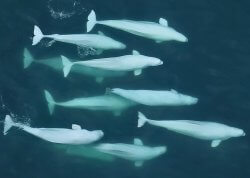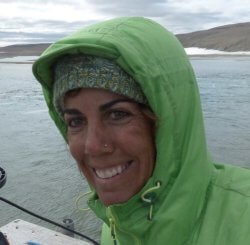This is World Whale Week – a time when we celebrate the cultures of whales of many kinds. Here are just a few of them.
How Beluga Whales Learn to Spot Each Other in a Crowd
In more ways than most people imagine, beluga societies are very like our own. Females form friendships, traveling together and cooperating to raise their young. The kids play and socialize together. And the older males form clubs and long-term alliances.
They learn all of this from their parents and families and from each other. It’s what we call culture: the knowledge, wisdom and behavior that we pass from generation to generation.
Beluga whales are denizens of Arctic and sub-Arctic waters, often traveling more than 3,500 miles each year and spending their winters and summers in different locations as they raise their young.

Photo of Belugas by Lisa Barry/NOAA/NMFS
During the summer, these highly sociable animals often have giant meet-ups, hanging out in the thousands close to the shore. But if you’re a beluga, how do you know where to go, what to do when you arrive, and how to behave when you’re meeting up with thousands of other whales, some of whom you know, others you don’t?
 To learn some of the answers, Greg O’Corry-Crowe, a research professor at Florida Atlantic University, led a multi-year study of belugas in various parts of the Arctic.
To learn some of the answers, Greg O’Corry-Crowe, a research professor at Florida Atlantic University, led a multi-year study of belugas in various parts of the Arctic.
His team followed generations of the whales, collecting genetic samples along the way.
And what they learned was that the whales pass along the knowledge of their travels and their routes from one generation to the next.
“Many other animals migrate on an annual basis,” explains Lori Marino, President of the Whale Sanctuary Project. “These remarkable journeys are based on social learning from one generation to the next. And that’s the basis of culture. Belugas aren’t just a migratory species; they’re a migratory culture.”
“Call Me Squeak-Trill-Pop!”
Another thing you need to know as a beluga whale, especially when you’re still a youngster among hundreds or thousands of other whales, is how to find your mom in the crowd and let her know where to find you.
We humans have names to identify ourselves. We don’t know whether that’s exactly what belugas have, but they do have individual contact calls. And these may well be the very first thing a baby beluga learns.
 Valeria Vergara, director of the Cetacean Conservation Research Program at Raincoast Conservation Foundation, has been studying communication among belugas for more than 20 years.
Valeria Vergara, director of the Cetacean Conservation Research Program at Raincoast Conservation Foundation, has been studying communication among belugas for more than 20 years.
She says that it would be highly beneficial to them, as well as fascinating to us, to understand their “language” better.
When we welcome the first belugas to their new home at the sanctuary in Nova Scotia, we’ll be able to listen in to their vocalizations and keep a record of them that we can share with scientists like Valeria Vergara and Greg O’Corry-Crowe.
The more scientists understand, the better they can help protect whales who live in the open ocean. This kind of work underscores how important the sanctuary will be for whales who have lived in captivity as well as whales in the wild.
For more about beluga culture, go here. And Greg and Valeria will be among the guests at an upcoming webinar on February 24th.
Next: How Sperm Whales Taught Each Other to Defeat Whaling Ships